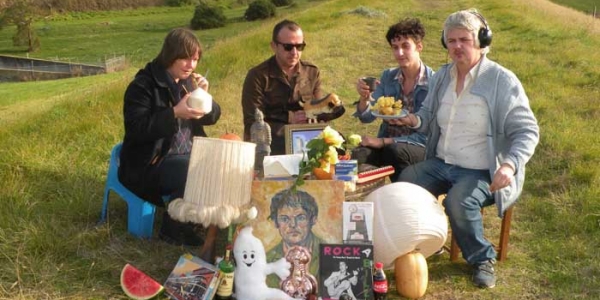So observed American novelist Henry Miller in his 1953 novel Plexus, the second novel in Miller’s trilogy based on his relationship with his wife June. It’s an assessment of suburban life that resonates ever greater in today’s world suburban housing states, replete with two-story residences, double-garages and consumer modern conveniences: the world of the new estate.
When Perth band Sleepy Township reached its natural termination point about ten years ago, Mia Schoen founded New Estate, the new band’s title reflecting Schoen’s interest as a visual artist in the peculiar sociology and architecture of the suburban housing estate. “As Sleepy Township was coming to an end, I decided I wanted to form a band that was more rock, and less twee as we’d been labelled at the time,” Schoen says. “I’d already decided I wanted to call it New Estate, because that was my interest with my painting at the time, and it was a nice progression from Sleepy Township,” she laughs. “I do like the desolation of a new estate, so in that sense, New Estate is a contrast to that.”
The band’s original lineup comprised Schoen, guitarist Marc Regueiro-McKelvie and fellow former Sleepy Township members Chris Gorman and Mindy Mapp, on drums and bass respectively. Mapp, who’d agreed to fill in on bass on a temporary basis, was replaced subsequently by Brad Cosier. “Mindy was studying, but she just didn’t have the time,” Schoen says. “Mindy’s last gig was at The Tote, and during the gig we asked if anyone wanted to play bass with us. After we packed up the gear, we went out to the bar to find Chris talking with Brad, who’d volunteered to be our bass player.”
Cosier’s time in the band finished in Brisbane, at the tail end of an eastern states tour. “Brad didn’t enjoy the tour – he thought we were really disorganised and unprofessional,” Schoen says. After a brief search, New Estate settled on Toby Dutton from Flywheel. “Toby had been a friend for a long time. We knew of Flywheel’s work, and I liked the songs Toby had written for Flywheel. A friend had told me Toby was at a loose end because Flywheel wasn’t playing live, so I asked him, and he was totally stoked to join our band,” Schoen says.
New Estate’s previous record, Is It Real, was released on the now defunct Low Transit Industries label (“We don’t have any copies of that record anymore,” Schoen confesses). With LTI in hiatus following label boss Darren Smallman’s departure to England, New Estate convened to write the songs that would appear eventually on the band’s latest release, Recovery. “We probably started writing about a year before we started recorded the album,” Schoen says. “Once Toby joined we were really keen to start playing new stuff.”
Each of the members of New Estate – including Dutton – contributed to the songwriting on the new record. “We don’t tend to write collaboratively, except for the songs on the album that Chris sings,” Schoen says. The tracks themselves suggest a more deliberate pop sensibility than the guitar-laden tone of previous New Estate records. Schoen says the different artistic style of Recovery wasn’t deliberate. “I don’t think anything we do is really deliberate,” Schoen says. “It’s just what comes out. On my part it’s probably a lack of skill! We’ve had reviews in the past where people have said that we’re trying to be Pavement, or trying to be someone we’re not good enough to be – which I find really funny, because I wish we could be like someone I really admire,” she laughs. “We never sit around and say ‘Okay, we want to sound like this’,” Schoen says. “It’s just whatever comes out on the day.”
Recovery sees Schoen (and Gorman) reunite with former Sleepy Township colleague Guy Blackman, with the album being released on Blackman’s Chapter Music label. “I don’t think Guy really liked New Estate’s other records, maybe because it didn’t really fit with the other music on Chapter,” Schoen says. “But when we had finished the album we were shopping it around, and we sent a copy to Guy, and he called us up and said he’d be happy to put it out. It’s a great label, and Guy is really enthusiastic about music.”
BY PATRICK EMERY







